Emotional CSUN Award Ceremony Focuses on Mentors and Students
It was a night to honor exceptional mentors at California State University, Northridge, but the five recipients of the 2017 Don Dorsey Excellence in Mentoring Awards just wanted to talk about their students.
“It’s the students who keep me here,” said Elizabeth Riegos-Olmos, director of the Student Services Center/Educational Opportunity Programs (EOP) in the College of Science and Mathematics. “They’re just amazing individuals, and they have such challenges and obstacles that I’m in awe that they’re here and they’re fighting for their education. I feel fortunate they trust me enough to allow me into their lives and give me the opportunity to share in this journey.”
The annual awards were founded by staff in the Faculty Mentor Program and EOP, and the accolades are named for educational psychology and counseling professor Don Dorsey, who helped develop CSUN’s first mentor training program. They recognize faculty and staff who have made exceptional contributions to mentoring past and present students; who take a holistic approach to mentoring, including academic and personal support; and who demonstrate proactive involvement in the university’s commitment to the success of students of diverse backgrounds and communities.
This year’s awards ceremony was held Nov. 29 in the Delmar T. Oviatt Library. Riegos-Olmos was honored alongside Curt Dommeyer, professor of marketing; Adrian Pérez-Boluda, professor of modern and classical languages and literatures; Samir Hamawe, peer education coordinator, University Counseling Services; and Harry Hellenbrand, professor of English and provost emeritus.
Fittingly, it was the words of students — those touched by CSUN’s community of mentors — that gave the ceremony its emotional punch. The students’ stories were shared in excerpts from letters, web presentations and in tearful speeches given by the students themselves. The testimonials highlighted the extraordinary efforts of CSUN faculty and staff who had acted as educators and as human beings, inspiring students to improve academically and in life.
Glenn Omatsu, EOP Faculty Mentor Program coordinator, also read notes of praise for mentors who were nominated but not selected, demonstrating the stiff competition for the awards.
Elizabeth Riegos-Olmos
For 15 years, Riegos-Olmos has advocated for first-generation, low-income students from historically underrepresented communities. She knows every one of her students’ names and their stories, said Christina Espinoza-Guzman, science and mathematics graduation and retention advising specialist, who shared students’ testimonials. For example, Riegos-Olmos once accompanied a student who didn’t know anyone on campus to a Thanksgiving dinner for foster youth.
“No matter how busy she is, she finds time for students, and she makes you feel important,” another student wrote. “She makes me feel like I matter, [that] whatever I say or think, whatever I do, all my hard work will pay off in the end.”
Curt Dommeyer
Dommeyer, in his last semester of teaching after nearly 40 years at CSUN, could not personally accept his award because of his commitment to teaching. He had to leave the ceremony early because, he said, he had “a classroom of marketing research students waiting for me to start class.”
Barbara Gross, chair of the Department of Marketing, who nominated the professor and accepted the award on his behalf, said Dommeyer deserved the award because he immerses his students in real-world research projects and provides them with opportunities that students — especially undergraduate students — do not normally get. He has co-authored papers with 45 individual students, Gross said, including 41 undergraduates, resulting in 12 peer-reviewed journal articles and six full papers published in conference proceedings.
Testimonials from former students spoke of Dommeyer as the “catalyst” to a successful career, someone who encouraged them to persevere until they reached heights they didn’t know they could reach. One former student was touched that Dommeyer wrote him a letter of recommendation for a job, and then followed up to see how things were going.
“This is the mark of a true mentor,” the former student wrote. “Someone who not only offers direction during a pivotal time in one’s life, but who also follows up once decisions have been made and paths have been chosen.”
Samir Hamawe
Heidi Rodas Escobar was one of three students who nominated Hamawe, who coordinates four University Counseling Services projects dealing with depression education, sexual assault prevention and eating disorder awareness.
“Had it not been for his involvement and passion, we would not have grown to reach thousands of CSUN students,” said Rodas Escobar, a peer educator in the Joint Advocates on Disordered Eating (JADE) program. “As a cohort, we support one another throughout our difficulties, and Samir has always provided us with a space to be proactive within our campus and beyond. He has given us the opportunity to create a home away from home.”
Hamawe ’12 (Psychology), M.S. ’15 (College Counseling and Student Services) said he was grateful to be around his student volunteers, and he admired their resilience while completing their degrees. As a CSUN alumnus, he said he learned from his own mentors about how to help his students.
“I never really make a decision without asking 20 people first,” Hamawe said. “Coming in to graduate school, I would finish a presentation [by] asking, ‘How did I do?’ I think that self-doubt is still there, but it has also aided a lot of my success. I’ve let my students know it’s OK not to know, it’s OK to find things difficult, it’s OK to fail, it’s OK to be stopped and have to return again. Your circumstance isn’t who you are — it doesn’t define you. It’s only one little piece of the puzzle that you’ll eventually look at in the grand scheme of things.”
Adrian Pérez-Boluda
Professor Adrian Pérez-Boluda, chair of the Department of Modern and Classical Languages and Literatures, was nominated by five of his students. Two of them, Matilde Fuentes and Gloria Oliveri, introduced him at the event, with Oliveri giving a speech in Spanish and Fuentes translating.
“Just like us, professor Pérez-Boluda arrived in America with dreams, some of which have already become a happy reality,” Oliveri said, choking up with emotion while Fuentes translated. (Pérez-Boluda grew up in Sant Vicent del Raspeig, in the Spanish province of Alicante.) “Obtaining an education definitely has a positive impact on people and their society. Here at CSUN, it is a relief to know that diversity is an institutional value and that we should all be proud about it. For such a diverse group of students, there is nothing greater than knowing we can count on a professor who understands and empathizes with us.”
In accepting his award, Pérez-Boluda reflected on the meaning of mentorship.
“Being a mentor is not only about offering our students individualized guidance in academic matters, but it is also about knowing and defending their right to receive the best education possible — as well as listening to the challenges they face in different aspects of their lives, and letting them know that they are not alone during their journey through the university,” he said.
Harry Hellenbrand
Every year beginning in 2004, former EOP Director José Luis Vargas personally selected one recipient of the mentorship awards. Vargas passed away in 2016, but his legacy was honored with an award presented to Harry Hellenbrand, English professor and provost emeritus, for his years of service to EOP and EOP students. Shiva Parsa, director of EOP, spoke of the mutual trust and respect between Hellenbrand and Vargas.
One of Hellenbrand’s mentees, Frankie Augustin ’95 (Cellular and Molecular Biology), M.S. ’05 (Health Administration), now the interim chair of the Department of Environmental and Occupational Health, said she would not have risen to her current status without his help, comparing Hellenbrand to the first domino in a line.
“People will take hundreds of pieces of dominoes and stand them up around in the room in some intricate pattern, and spend countless hours doing this, only to watch it fall, and people are thrilled by this,” Augustin said. “The most important piece is that very first one. It’s the piece that has that impact and creates this chain reaction for all the other pieces. And for me, that’s Harry.”
Hellenbrand couldn’t hold back tears as he accepted his award and remembered his lost colleague.
“I remember I had a baseball coach once who told me, ‘Every challenge is a mountain, and what you have to remember is there are hundreds of ways up the mountain — you have to figure out which is the best way for you,’” he said. “The job of the mentor, I’ve come to believe over the years, is to provide the confidence that anybody can make it up that mountain. You have their back, and you provide them with confidence. That’s our job as mentors and teachers, and I think that’s what José Luis did so well.”

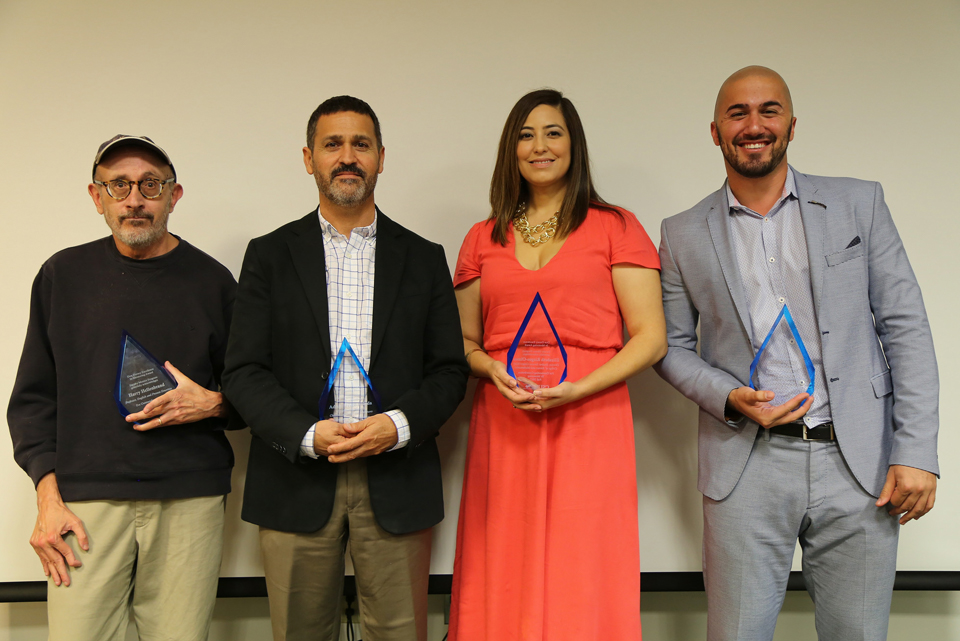
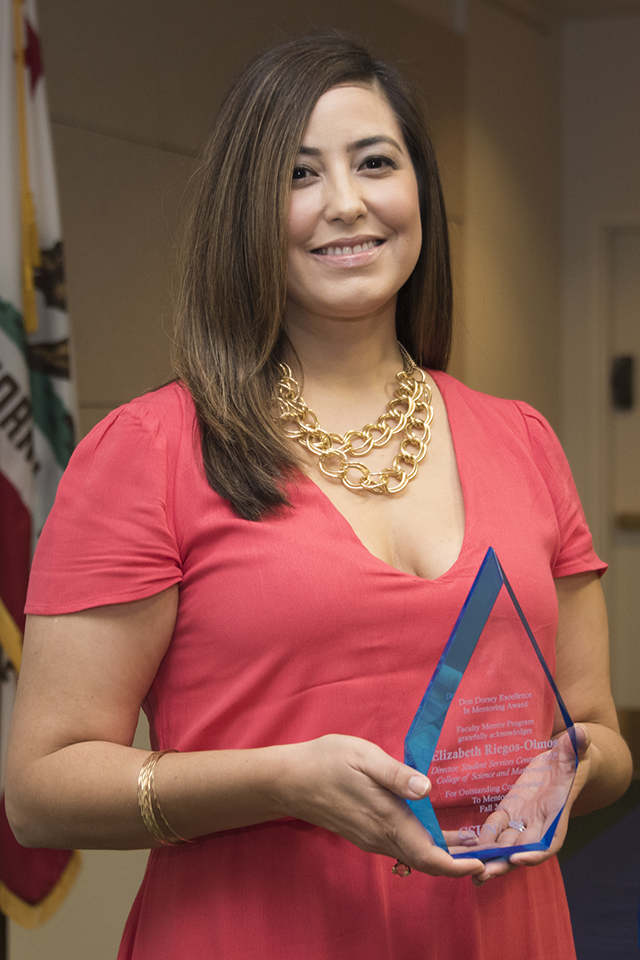
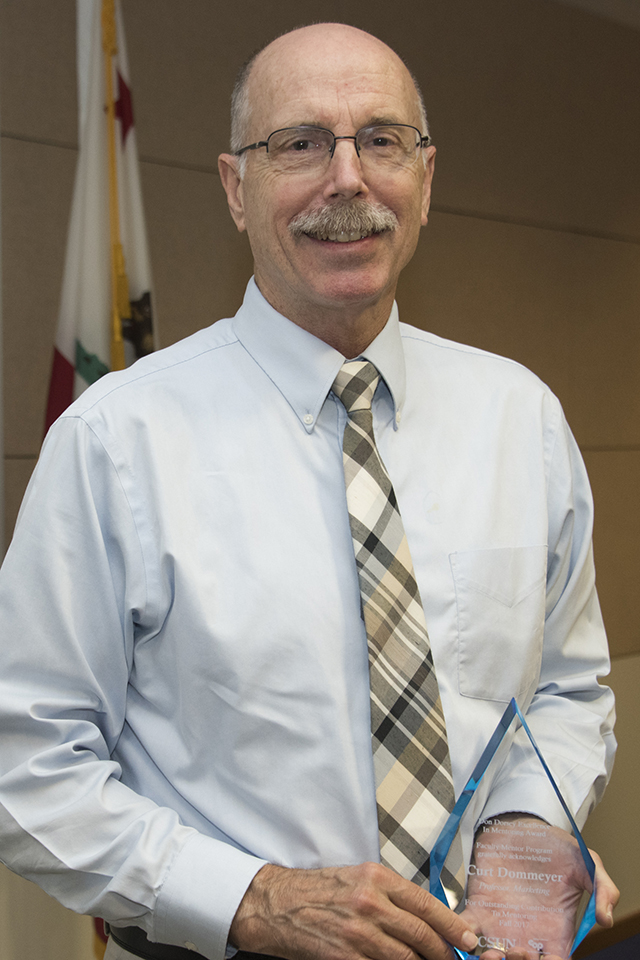
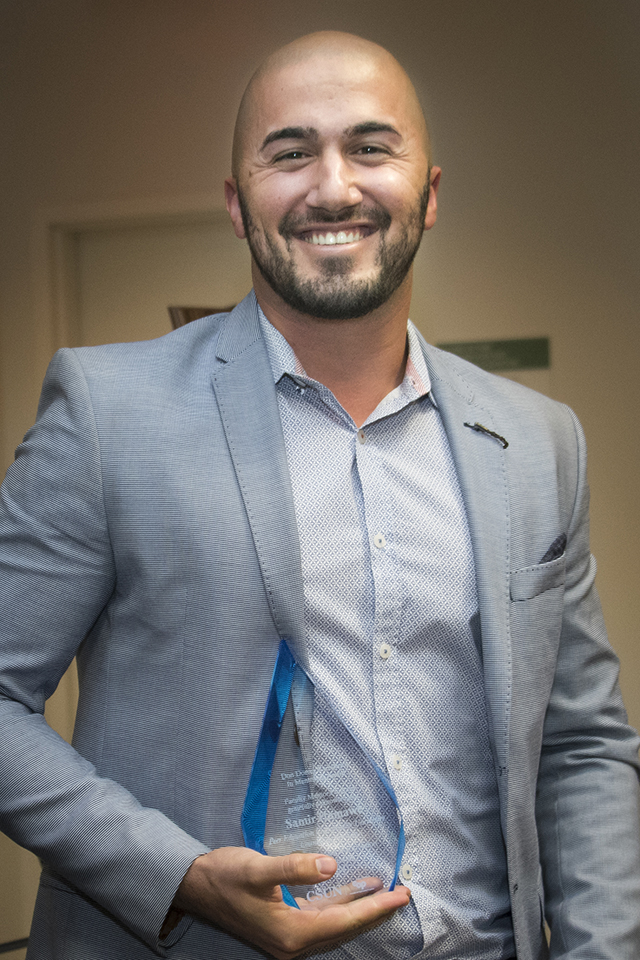
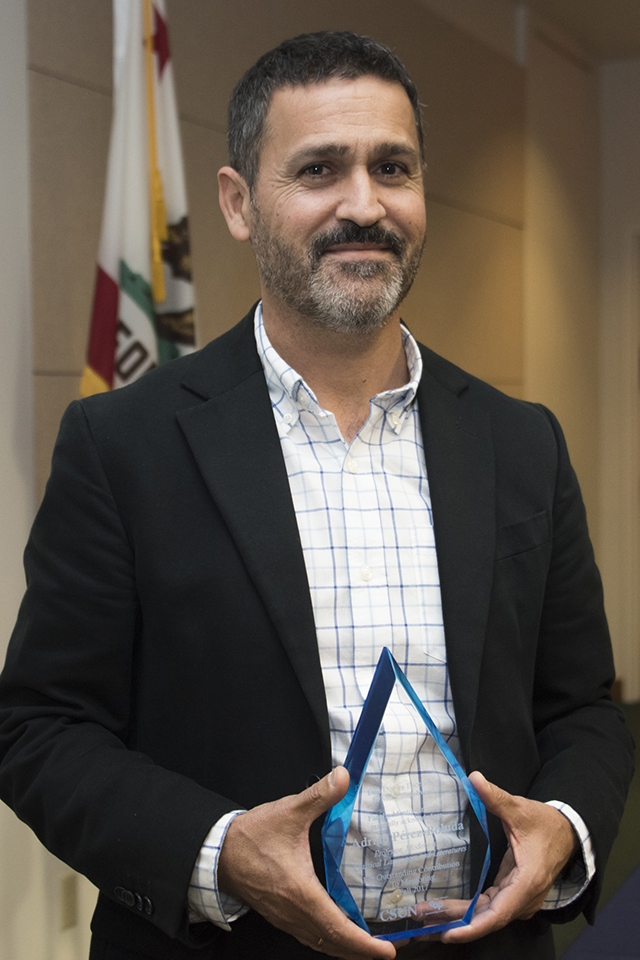
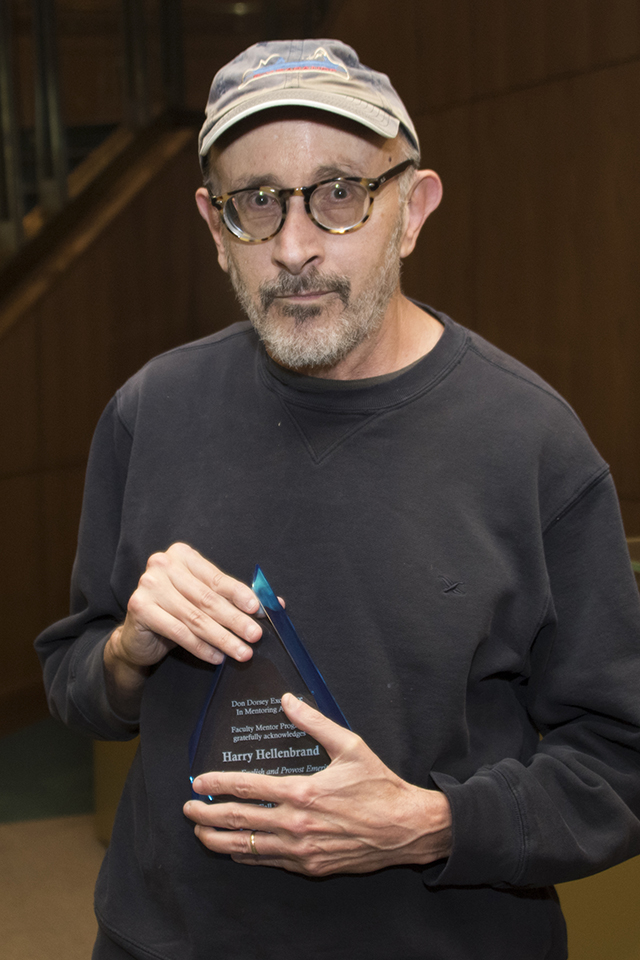
 experience
experience